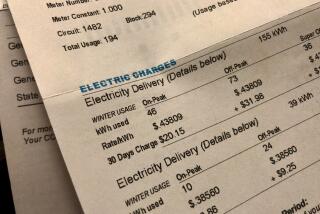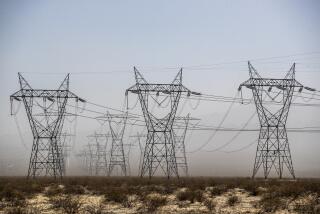Tug of War for Dam System
- Share via
The bankruptcy of Pacific Gas & Electric could soon cost the state its regulatory control of a precious asset--tens of thousands of Sierra acres and hundreds of miles of river and reservoir shore that are part of the utility’s hydropower system.
PG&E;, the state’s largest utility, shocked Gov. Gray Davis last April by voluntarily filing for bankruptcy. True, energy companies had refused to sell the firm any more power because PG&E; was out of money. But the San Francisco-based company abruptly rejected efforts by Davis to negotiate a state rescue plan to keep the firm from going into bankruptcy. Shortly after that, Davis announced an agreement to save Southern California Edison from forced bankruptcy.
PG&E; was thumbing its nose at state officials and at a deal it deemed not good enough. Today, PG&E; remains at war with the state--specifically the state Public Utilities Commission. The struggle involves PG&E;’s reorganization plan, which could put at future risk some of the state’s finest natural assets.
The PG&E; plan would require that federal bankruptcy Judge Dennis Montali override state laws and regulations to implement it; a ban on selling generating plants would be among the provisions lifted. The company would transfer its huge hydropower system, valued at more than $3 billion, to a new subsidiary that would not be subject to state public utility regulation. PG&E; says the spinoff would allow it to obtain much of the new financing it needs to pay off its debts, estimated at $13 billion.
The state has a strong interest in the vast system of dams, tunnels and powerhouses up and down the Sierra range. Stream flows from dammed areas affect irrigation districts, whitewater recreation, fish populations and more. Dam safety is a constant concern. The company has been a good steward of its forest lands, but the next owner could face heavy pressure from logging companies.
PG&E; insists that the hydro system would be operated essentially as it is now under a 12-year contract. But there’s no guarantee that the subsidiary would have as much regard for forests, wildlife habitat or recreational users. At the end of the 12 years, the hydro system could be sold and the pressure to exploit resources would be even higher.
There was a serious effort in the Legislature during the past two years to buy the hydro system from PG&E.; It failed because PG&E; even then wanted to transfer hydropower to an unregulated offshoot so it could charge market rates.
The PUC is preparing an alternative plan that would not allow the hydro system spinoff. PG&E; officials insist that the PUC plan would not pay off all the debt. Lawmakers therefore should consider a new proposal for state purchase of the hydro system. It’s a moneymaking asset that the state would have great interest in conserving, a good deal all around.
More to Read
Sign up for Essential California
The most important California stories and recommendations in your inbox every morning.
You may occasionally receive promotional content from the Los Angeles Times.










